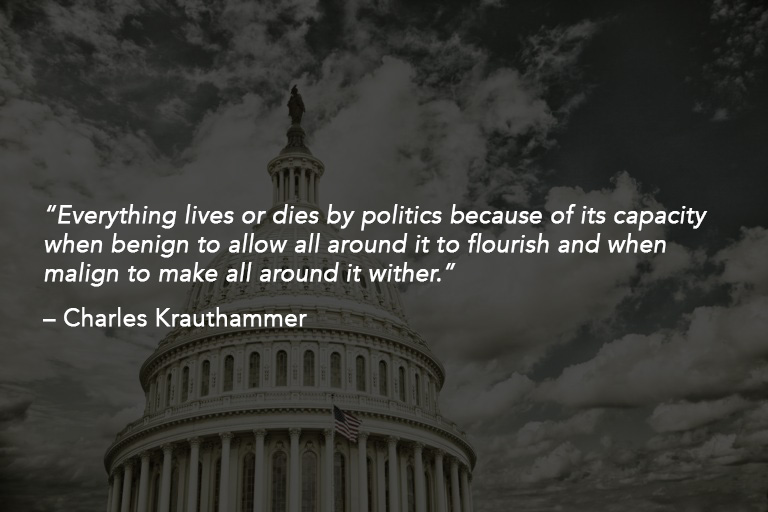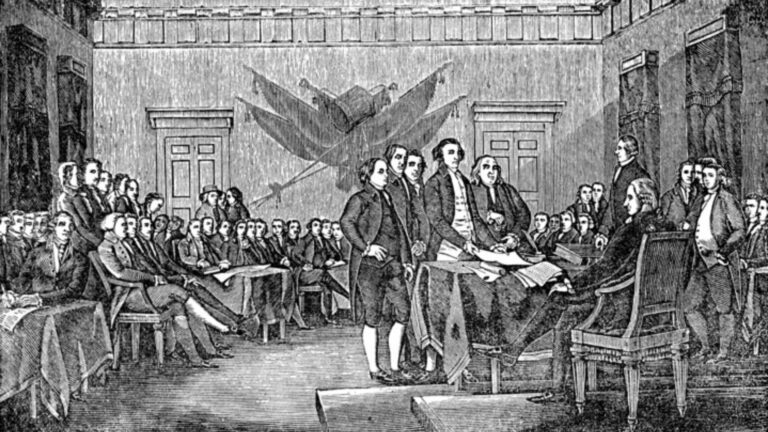A New American Grand Strategy to Counter Russia and China A
By John Bolton - First, Washington and its allies must immediately increase defense budgets to Reagan-era levels relative to gross ...

The goal of this site is to broaden understanding of how good governments and societies develop sound institutions and share fundamental operating principles and how the worst countries violate these principles. By exploring the material on, and links to, this site you can gain insights into what makes governments and societies successful or tragic, the major threats to their continued success, and the characteristics common to the various types of bad government.
This site is designed as a model or demo from which think tanks and similar organizations might draw ideas to create a special section on their own websites structured along similar lines for purposes outlined herein. As envisioned, this special section would have three roles: Read More

Government is a requirement for the development and maintenance of civilization. A civilized society cannot develop without a government that can keep a reasonable level of order by providing and enforcing a legal system and providing for the common defense. Two of the most crucial characteristics of government are, 1) what does government see as...
“Everything lives or dies by politics because of its capacity when benign to allow all around it to flourish and when malign to make all around it wither.” Krauthammer’s observation applies so appropriately to socialism because socialism is malign. It is malign because it relies on envy (the most dangerous of the social passions) for...
People so often fail to realize why free-market capitalism is so much more productive than any system where economic decisions are made by top down decisions by the government. When the government makes all the decisions for any type of economic activity it does so in a monopolistic setting. Decisions made in a monopolistic framework...
Americans are inclined to believe that democracy will solve any country’s problems. Democracy is fragile and if we are to continue to lead the world in our quality of government we need to understand how best to protect the institutions and traditions that have made democracy so successful in America. Democracy has only worked well...
Recently Progressives have managed to combine so many narrowly focused and diverse self-interested groups that they are on the cusp of achieving a working majority. What’s new is that government’s role in social policy and transfers has grown so large that a great many people who formerly took little interest in public affairs are now...
Progressives believe that government run by experts should have a larger role in the economy and in running our lives than has historically been the case in free market economies. They believe government planners are altruistically motivated and can run an economy more successfully than a lightly regulated free market. Progressives appear to put more...
One of the most corrupting influences of current elite culture is its success in popularizing a set of beliefs it defines as politically correct and in demonizing views that challenge those beliefs. Political Correctness (PC) is both political propaganda and a belief system. Its use for political control in totalitarian systems is obvious, but how...
Most advanced social democracies cannot defend themselves because voters have become so addicted to government benefits that when politicians are faced with the challenge of reducing military spending or transfer payments, they will always reduce military spending. The social democracies of Western Europe have largely abdicated responsibility for their defense and would not exist in...
If you Google principles of government you will see the seven basic principles of the U. S. Constitution; popular sovereignty, limited government, separation of powers, checks and balances, federalism, republicanism and individual rights; the fundamental principles of American government. They undergird, are the foundation for, the successful operation of the principles of government addressed on...
MARRIAGE and FAMILY, EDUCATION, WELFARE, IMMIGRATION – A good democracy must have a critical mass of intelligent, informed and responsible citizens who are interested in the public welfare. Several demographic trends are decreasing the proportion of such citizens in the United States. The average birth rate of less intelligent citizens is higher than that of...
RELIGION, MORALS, MORES AND CUSTOMS – The moral character, religion, customs and mores of the citizenry are tremendously important factors in determining the quality of government in a democracy. Religious, civic, and political associations are crucial in thwarting the tendency of central government to involve itself in all areas of life. The society should be...
A successful democracy will have a well-designed government structure and a sound political system for the election of its leaders and legislators. A – The US Government structure, with a president, two houses of Congress, and a Supreme Court, with carefully balanced powers between them; with the further checks on centralized power by our system...
An effective defense and foreign policy and the ability to keep internal order without infringing on individual freedoms are prerequisites for any successful government. World order and stability is dependent on US defense and alliance strategies and its ability to maintain open sea lanes, use of space, etc. Nothing is more important than the US...
BUDGET AND TAX POLICIES A – Budgeting and expenditures must be carried out on a sound long term basis for government to be successful in the long run. Short of war or inability to keep internal order the surest way for a democracy to get in trouble is to overspend and particularly to overspend in...
Entitlements, welfare, tax policy and education can all have enormous effects on the quality of life and the strength of an economy. Getting incentives right in these areas is one of government’s most important roles. Government should aim for social policies that assist people in facing unusual adversity and act as stabilizers in times of...
Reasonably free markets with transparent financial information, where government regulation is sensibly designed and impartially administered (without political favoritism), are necessary for a country to achieve its economic potential and compete successfully in the world economy. Ill advised, excessive and overly complex regulation can cripple an economy as easily as corruption and can also foster...
Maintaining a stable value of money is one of government’s most important roles. The dual mandate of the Federal Reserve is probably a mistake, as the goals of maintaining full employment and a stable currency are often in conflict. Inflation is similar to taxes in that it distorts economic decision making and thus is a...
Good government requires a sound and fair legal system that protects private property rights and individual freedoms, that treats people equally and in so doing counterbalances political power, that operates along clear guidelines and is understandable and predictable; and that has an effective and fair criminal justice system. It is extremely important in the application...
We are wholly dependent on the natural environment. Designing policies to protect it and regulate activities that impact it is one of government’s most difficult and important tasks. It is difficult because the science required to understand how various human activities affect the environment is so complex, because the interpretation of the science is subject...
By John Bolton - First, Washington and its allies must immediately increase defense budgets to Reagan-era levels relative to gross ...
By Gerald F. Seib - Today, the movement to weaken the national party structures that began in 1968 has reached ...
By Bjorn Lomborg - … the global elite has an unhealthy obsession with climate change.... First, it has distracted the ...
By Matthew Spalding - Wherever this agenda is allowed to take root, free expression and academic integrity are doomed…The first ...
By David Satter - The Bolshevik coup had two consequences. In countries where communism came to hold sway, it hollowed ...
By John Walters – By and large, we do not believe that there are individuals with great ruling talent who ...
By Phil Gramm and John Early - Real government transfer payments to the bottom 20% of household earners surged by ...
By John Ellis - Only a few years ago, several well-established features of the current political landscape were too absurd ...
By Christopher Caldwell - ...In this view, the civil rights movement wasn’t just a reform but a refounding....The real political ...
By Arthur Milikh - Summer 2021 Issue, National Affairs - From the birth of the modern conservative movement, dissidents concerned ...
By Kimberly A, Strassel - May 11, 2021- Would the IRS violate your privacy to further Democratic policy objectives?....The lesson ...
By Gerard Baker - Jul 6, 2020- At the end of the 20th century, the U.S. had won World War ...